Feb 28, 2014
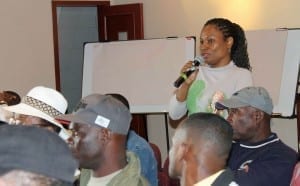
Some 127 labor activists took part in the second Afro-Colombian Labor Council conference in Bogotá. Credit: Rhett Doumitt
Ready to power forward with new grassroots organizing and mobilization outreach, 127 Afro-Colombian labor and community leaders met in Bogotá in recent days for the second national forum of the Afro-Colombian Labor Council (CLAF).
During the two-day gathering, Afro-Colombian labor rights activists shared the organization’s successes—among them, the amazing growth of the Domestic Service Workers’ Union (UTRASD) from a locally based group in the city of Medellín to a nationwide organization with 250 women.
A quarter of Colombia’s population is Afro-descendant, yet Afro-Colombians comprise more than 50 percent of the country’s poor. Formed in July 2012, CLAF is the first national organization to explicitly tackle the exploitive working conditions that most Afro-descendants suffer. Since its launch, CLAF has expanded from a national coordination board to an organization with 10 local chapters across Colombia, including Bogotá, Cartagena, Santa Marta, Urabá, Valle del Cauca, Medellín and Buenaventura.
“When you build things collectively, then everyone takes ownership of them,” said Agripina Hurtado, president of the CLAF executive board. “We need to promote the vision of where we are going—grow, connect and advocate around the challenges facing all Afro-Colombians.”
The non-governmental organization Escuela Nacional Sindical (ENS) presented research on working conditions in predominantly Afro-Colombian economic sectors, such as construction, domestic work, and ports, where ENS researchers found extreme levels of labor informality. Afro-Colombians are far likelier than other Colombian workers to earn less than the minimum wage and to be employed in jobs where they cannot form unions to improve their working conditions.
Leaders and activists at the meeting, held with the support of the Solidarity Center and the International Labor Organization (ILO), developed a three-pronged work strategy focusing on organization building, public policy advocacy and formalization of work.
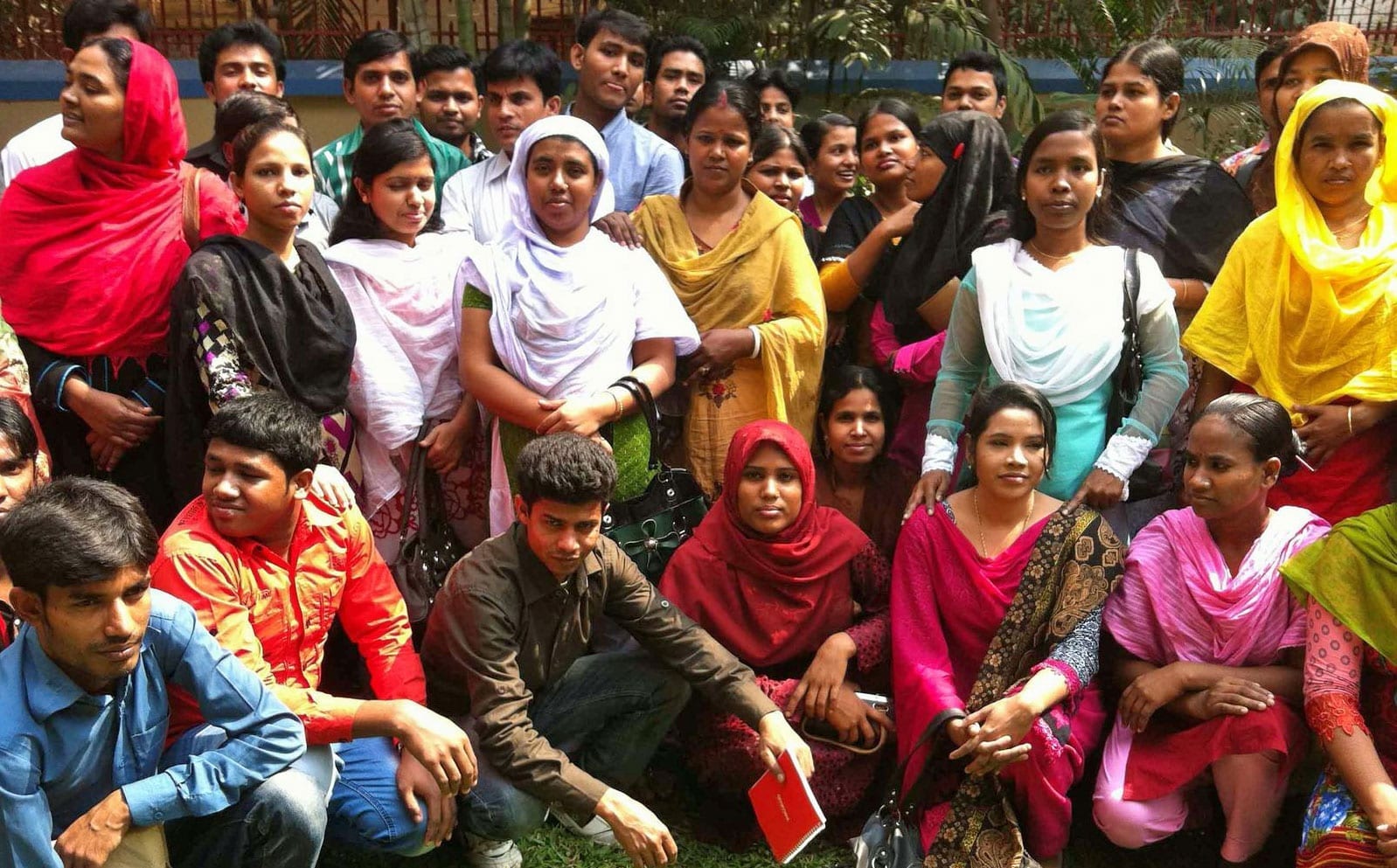
Feb 25, 2014
A Bangladesh garment worker leader and four union organizers, among them two women, were badly injured Saturday when about two dozen people beat, kicked and threw them to the ground as the five were speaking to workers in the dormitory where they live. One of the organizers was taken from the scene, beaten severely and dumped, unconscious, nearby. He and a female organizer remain in the hospital. The whereabouts of the garment worker are unknown.
According to several witnesses, the attack was carried out by factory managers and other men and women, some of them who worked for the factory, potentially paid to carry out the act—not an uncommon practice in the country. The women in the group were separated from the others and threatened with rape.
The organizers, all working with the Bangladesh Federation of Workers Solidarity, were supporting workers who had earlier approached the union for assistance and who had been fighting to be paid the minimum wage at their factory. The factory, which manufactures for Western brands, employs approximately 4,500 workers—many of who had staged a wage protest February 18, which was ultimately put down by police.
On Saturday, the organizers and activists from the factory floor signed up about 300 workers for a union before the attack occurred—though all the signed authorization cards were stolen during the assault.
Workers, activists and the Solidarity Center are calling for a thorough and vigorous investigation into the crime that brings the perpetrators to justice and shows that Bangladesh is unwilling to tolerate attacks on workers’ right to freedom of association.
The Solidarity Center is providing legal assistance and support for medical expenses for the injured organizers, and partners with the Bangladesh Federation of Workers Solidarity.
Feb 18, 2014
Garment workers and workers in other industries in Bangladesh’s export-processing zones are subject to a different, much weaker set of labor laws than workers in the rest of the country, and the government must take steps to reform laws so they meet international standards for freedom of association and collective bargaining rights, said A. K. M. Nasim, senior legal counselor at the Solidarity Center’s office in Dhaka, the Bangladesh capital. Further, “if we have any half-hearted reform in the legislation, it will mean that the workers will have to continue their struggle for a period of at least a generation to achieve these fundamental rights.”
Speaking at a recent forum in Washington, D.C., Nasim gave an overview of the current labor rights environment for Bangladeshis and provided key recommendations for improving their wages and working conditions.
Some 377,600 workers, the vast majority women, work in eight export-processing zones (EPZs) throughout the country.
Bangladesh derives 20 percent of its income from exports created in the EPZs, which are industrial areas that offer special incentives to foreign investors like low taxes, lax environmental regulations and low labor costs.
Yet while workers outside the EPZs are permitted to form trade unions, EPZ workers must form weaker workers’ welfare associations. Even though the associations have the right to bargain and negotiate agreements with employers, in practice, employers do not let the workers form their associations easily. Leaders of workers’ associations who actively promote the interests of the employees “have been fired from their jobs,” Nasim said. “As a result, most of the workers’ associations in the EPZs remain in existence only on paper.”
Nasim discussed the decision last June by the U.S. government to suspend Bangladesh’s trade benefits based on the country’s chronic and severe labor rights violations. The United States suspended its Generalized System of Preferences (GSP) agreement with Bangladesh after 112 workers were killed in a 2012 fire at the Tazreen garment factory, and more than 1,100 died last April when the Rana Plaza building collapsed. Since the GSP suspension, the Bangladesh government has allowed some 100 unions to register, in contrast with the few unions recognized prior to last year.
The Rana Plaza disaster also led to the Accord on Fire and Building Safety in Bangladesh, a five-year binding agreement between international labor organizations, non-governmental organizations (NGOs) and retailers in the textile industry to maintain minimum safety standards. The tragedies also have generated an increase in NGO involvement, and Nasim urged the NGOs working to improve workplace safety and health to support workers in forming and running unions, and making sure they are sustainable in the long run.
Also speaking at the forum, Solidarity Center Asia Regional Director Tim Ryan showed how the economic and political intersect in the Bangladesh context as described by Nasim.
“Bangladesh is a crucible for the intersection of globalization, the government’s economic policies, how these impact on the development of a democratic culture in civil society, and equitable and just economic growth that benefits workers and their families,” Ryan said. “A voice for workers in this process is absolutely crucial for growing democracy and democratic organizations in Bangladesh.”
The forum, “Strengthening Democratic Practices in Bangladesh: Empowering Workers in Export Processing Zones,” was sponsored by the National Endowment for Democracy and included Zerxes Spencer from the International Forum for Democratic Studies as moderator.
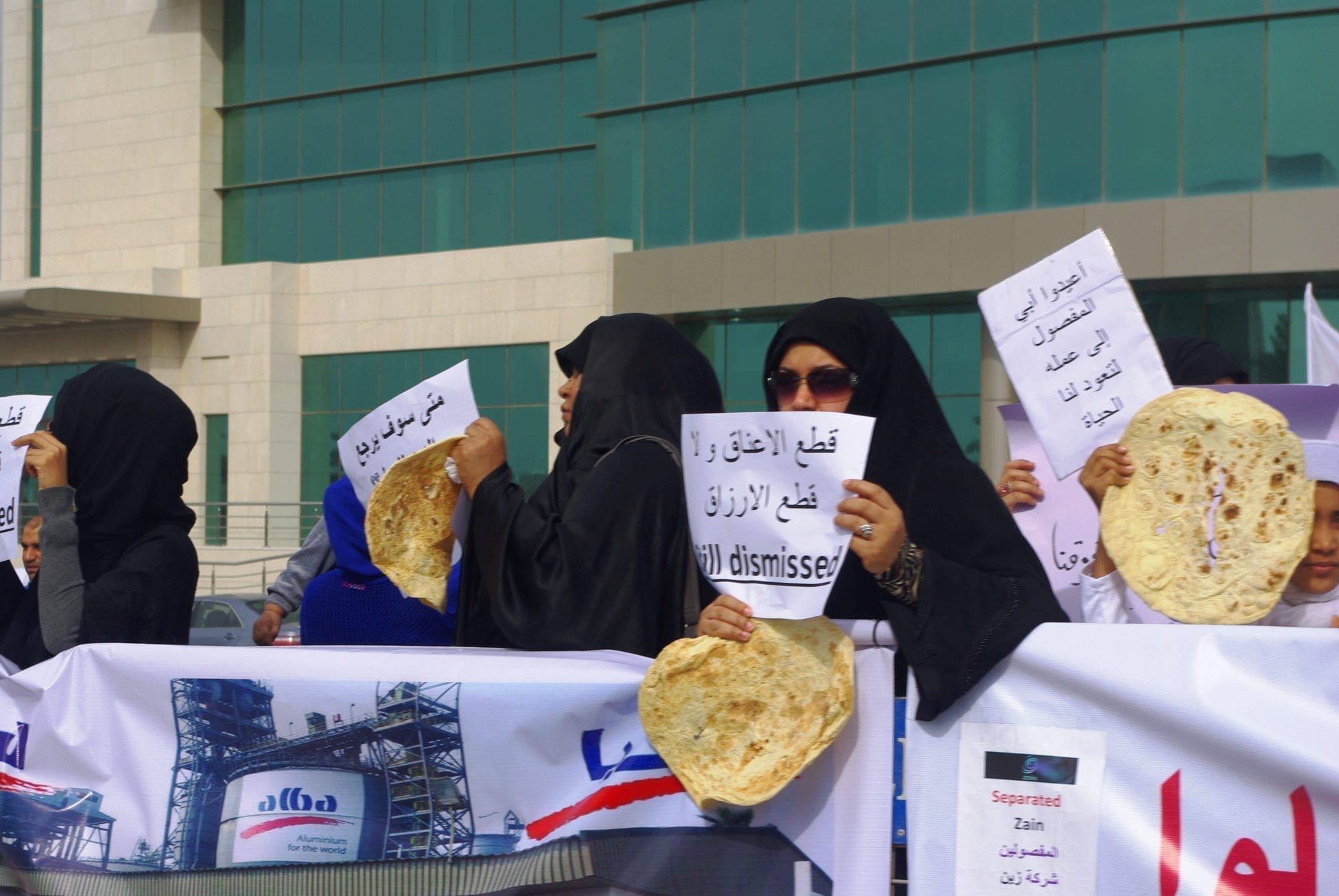
Feb 14, 2014
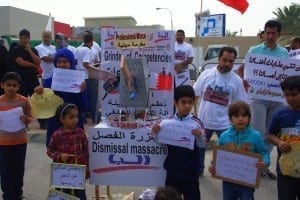
Many children of fired workers cannot attend school because their parents cannot afford tuition. Credit: Kate Conradt
Three years after the people of Bahrain stood up for a more participatory government, the crackdown on dissent and rampant discrimination in the workplace continues.
Hundreds of workers—including teachers, doctors, nurses and journalists who were doing their jobs when marches were met with violence—have been fired, demoted or sidelined at their workplaces. Many were imprisoned and tortured, including the president of the Teachers’ Association who remains in jail.
During a recent trip to the island country, the Solidarity Center met with workers still without employment despite government commitments to rectify wrongful dismissals. These include workers who were fired in the immediate aftermath of the February 2011 democracy protests and those who are losing their jobs now. One woman was fired after she was imprisoned and tortured for not surrendering a music cassette at a checkpoint. A hotel security guard, trained in emergency medicine, was fired for treating injured protesters. Leading medical specialists, including one of the country’s few rheumatologists, have been denied hospital credentials. Journalists say they have been blacklisted, not only in Bahrain but across Gulf countries, forcing them to seek a way to learn a living far outside their training.
In addition, workers reported that even if they had been reinstated to their jobs, their responsibilities had changed or disappeared. Managers have been demoted. Others have jobs in name only—but often not even a desk to sit at. One airport service worker had his job changed and was told to report to an isolated location and given nothing to do. This discrimination is systematically deepening, workers say, as companies ignore labor law when they fire staff or get rid of workers under the guise of restructuring—only to rehire for the same positions just “eliminated,” as happened with at least one worker at the national airline. Companies are even advertising and hiring from abroad for positions previously held by Bahrainis.
The crackdown also extends to trade unions, with union leaders being pushed out of their jobs and company-friendly unions being established. Longstanding unions no longer have access to managers to negotiate, as they had in the past. And union leaders often find themselves in court for random charges. At Bahrain Aluminum (ALBA) , the company has steadfastly refused to deal with a newly registered independent union, has ignored legal requirements to turn over dues payments and refused to respond to even one of the 40 letters the union has written to it. Meanwhile the country’s labor ministry has done nothing to remedy the situation.
Despite the atmosphere of discrimination and threats, workers continue to fight for their rights—and for the jobs from which they were wrongfully dismissed. They regularly march in front of the Ministry of Labor, hoping that justice will finally be served and that Bahrain can return to a place where worker rights and the rule of law are respected.
Feb 14, 2014
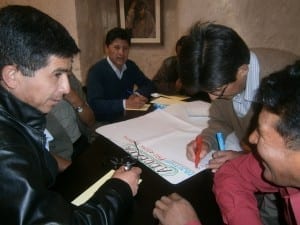
Textile workers at a meeting in Arequipa, where union leader López was fired after a successful contract campaign. Credit: Milko Sotomayor
José López Mota, former leader of a textile workers’ union local in Peru and current general secretary of the regional textile federation FERRETEX, was fired on February 10, 2014. He was dismissed after the union achieved a collective bargaining agreement in late 2013 for allegedly missing more than 15 days of work without permission. However, López was conducting union business during those days, using legally mandated union leave.
López led a highly visible campaign at the garment and yarn manufacturing factory where he worked, calling for management to negotiate a fair collective bargaining agreement. The union’s peaceful work stoppages that followed more than six months of labor-management negotiations were ultimately successful in gaining workers a collective bargaining agreement.
“They want a leader who does not speak up. I fought for union rights and alongside my brothers and sisters, we achieved two significant improvements in the two years that I was in charge,” López told Peruvian newspaper La República.
Last month, the union held elections in which López was replaced as general secretary. Although he continues to serve as the general secretary of the regional textile federation, he no longer is protected by “union immunity” (fuero sindical) extended to workplace union leaders.
The factory management says López took days off without permission. During that time, López used his protected right to take union leave to help conduct contract negotiations and attend labor conciliation meetings with company participation at the Arequipa regional labor directorate. But because he did not always ask for days off in writing, he has no paper trail to prove he was absent for legitimate union work.
“These methods (of repression) that were common practice in the past no longer generate the effect desired by employers who continue in this retrograde mentality,” said Geronimo López, Arequipa Region secretary-general of the Confederación General de Trabajadores del Perú (CGTP). The CGTP is one of Peru’s four main union federations. “On the contrary, to confront these anti-union actions, workers understand that they need to strengthen their unity and act with even greater commitment to defend their rights.”
Peruvian labor federations and international organizations are concerned about this violation of International Labor Organization (ILO) Conventions 87 and 98 (freedom of association and freedom to form a union and collectively bargain), and the intimidation tactics used to silence a labor rights defender in Arequipa’s booming textile and apparel sector.





